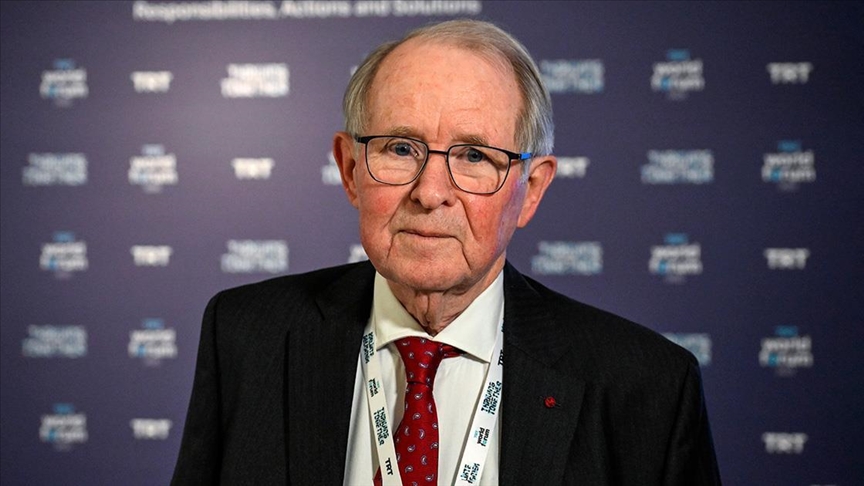International Criminal Court seems determined not to prosecute Israel for Gaza war crimes: Ex-UN rapporteur
‘Israeli Prime Minister Netanyahu, his war Cabinet, and many members of the Israeli army are responsible for war crimes, crimes against humanity and, possibly, the crime of genocide,’ says former UN special rapporteur John Dugard
 Former UN special rapporteur John Dugard
Former UN special rapporteur John Dugard
ISTANBUL
Israel and its leaders must face accountability for their crimes in Gaza, but the current prosecutor of the International Criminal Court (ICC) seems determined not to do that at the moment, according to a former UN special rapporteur.
“It’s important to stress that the Israeli leadership, Prime Minister (Benjamin) Netanyahu, his war Cabinet, and many members of the Israeli army are responsible for the commission of war crimes, crimes against humanity and, possibly, the crime of genocide,” Dugard told Anadolu in an interview.
“They must be held accountable for these crimes.”
Dugard stressed that the ICC is the primary institution that “should be used to hold Israelis responsible for their crimes” in the Gaza Strip, where Israeli attacks have now killed almost 18,800 Palestinians and wounded nearly 51,000 more.
“Unfortunately, at present, it (ICC) is not being used. The prosecutor of the ICC seems determined not to prosecute Israel and its leaders,” he said.
The current ICC prosecutor is Karim Khan, who has recently faced backlash for accepting an Israeli invitation to see Israeli areas attacked by Hamas on Oct. 7, while not being allowed to visit Gaza.
The ICC has received multiple cases against Israel for its devastating assault on Gaza, including referrals from countries such as South Africa and groups of lawyers.
Dugard said there is a pressing need for an immediate cease-fire in Gaza, but the international community has not been able to play its due role.
He pointed to the US position on the matter and its repeated veto of resolutions calling for a cease-fire.
If the UN Security Council decides there should be a cease-fire, “that will bring the war to an end very quickly,” he said.
“But I fear that the US will veto any resolution and that the cease-fire will not be ordered by the Security Council,” he added.
Dugard, who served as the UN special rapporteur on human rights in Palestine, also pointed to the possibility that Israel could simply ignore any move for a cease-fire.
“The difficulty is that even if the Security Council does order a cease-fire, there’s no indication that Israel will accept such an instruction and order from the Security Council,” he told Anadolu on the sidelines of the TRT World Forum recently held in Istanbul.
“Again, it would depend very much upon the US, UK and Western powers, whether they can force Israel to accept a cease-fire, to carry out a cease-fire and to bring peace to the region.”
No ‘real chance’ of diplomatic solution
Khaled Elgindy, director of the Middle East Institute’s Program on Palestine and Israeli-Palestinian Affairs, warned that there is no “real chance of a meaningful diplomatic process” to end the conflict because of the positions taken by Western powers supporting Israel.
“I don’t see any real chance of a meaningful diplomatic process that can end the conflict. In fact, I think the actions of the international community, particularly the unqualified and unconditional support for Israel’s war in Gaza, has made peace much more difficult to achieve now,” he told Anadolu in an interview at the same event.
The current deadly Israeli aggression has “added new layers to the conflict, maybe a generation or more of conflict,” he said.
“Even when this phase of the war is over, I think we can expect … to see prolonged violence on the ground in Gaza between armed groups and Israeli forces for the foreseeable future,” Elgindy added.
About the US specifically, he said its “unconditional support” has led to the “catastrophic situation” in the Gaza Strip, dismissing its pledges of humanitarian aid as an expected attempt to “try to compensate in some way for the damage.”
Elgindy said there has been a slight change in tone from some of Israel’s staunch supporters, particularly because of the significant number of civilian casualties.
“But overall, Western countries have not called for a cease-fire in the way that Arab and African states and the Global South have demanded an immediate cease-fire,” he said.
“Nothing’s going to change on the ground, except for the worse, until there is a realization in Washington, especially that Israel will not be able to achieve its military goals of completely destroying Hamas politically or militarily.”
*With contributions by Faruk Hanedar in Istanbul
Anadolu Agency website contains only a portion of the news stories offered to subscribers in the AA News Broadcasting System (HAS), and in summarized form. Please contact us for subscription options.







